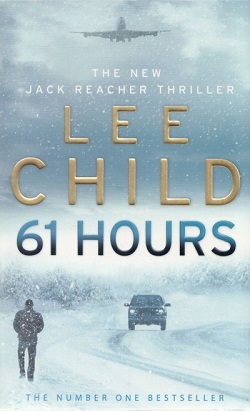61 Hours, the fourteenth installment in Lee Child's Jack Reacher series, is a gripping thriller that showcases the author's signature style of suspenseful storytelling and complex character development. Set against the backdrop of a harsh South Dakota winter, this novel plunges readers into a world of danger, moral dilemmas, and the relentless pursuit of justice. With a plot that unfolds over a mere sixty-one hours, Child masterfully crafts a narrative that is both urgent and compelling, keeping readers on the edge of their seats from start to finish.
The story begins with a dramatic twist as a tour bus crashes in a brutal snowstorm, inadvertently bringing Jack Reacher to the small town of Bolton. Reacher, a former military policeman with a penchant for wandering and a strong moral compass, finds himself in a place where justice is under siege. The town is embroiled in a tense situation involving a courageous woman named Janice, who is prepared to testify against a powerful drug lord. However, her life hangs in the balance as a cold-blooded assassin is dispatched to eliminate her before she can take the stand.
One of the most striking aspects of 61 Hours is its exploration of the theme of justice versus survival. Reacher's initial intention to move on is thwarted by his innate sense of duty and his growing attachment to Janice. This internal conflict drives the narrative forward, as Reacher grapples with the implications of intervening in a situation that could cost him his life. Child effectively uses Reacher's character to delve into the complexities of morality, questioning what it means to stand up for what is right in a world filled with corruption and violence.
Character development is another strong suit of this novel. Jack Reacher is portrayed as a lone wolf, yet his interactions with Janice and the townspeople reveal a deeper side to his character. He is not just a man of action; he is also a protector, willing to put himself in harm's way for the sake of others. Janice, on the other hand, is depicted as a formidable force in her own right. Her courage and determination to seek justice make her a compelling counterpart to Reacher, and their dynamic adds an emotional layer to the story. The chemistry between the two characters is palpable, and their relationship evolves in a way that feels authentic and earned.
Child's writing style in 61 Hours is both concise and vivid, painting a stark picture of the harsh environment and the high stakes involved. The snowstorm serves as a metaphor for the chaos and danger that envelops Bolton, creating a palpable sense of tension throughout the narrative. The pacing is relentless, with each chapter ending on a note that compels readers to keep turning the pages. Child expertly balances action sequences with moments of introspection, allowing readers to connect with the characters on a deeper level.
The novel also raises questions about the nature of evil and the lengths to which individuals will go to protect their interests. The assassin, a chilling figure who embodies the cold efficiency of a predator, serves as a stark contrast to Reacher's moral complexity. This juxtaposition highlights the broader themes of power, control, and the consequences of one's choices. As Reacher races against time to thwart the assassin's plans, the tension escalates, leading to a climactic showdown that is both thrilling and thought-provoking.
In comparison to other thrillers, 61 Hours stands out for its intricate plotting and character depth. While many authors in the genre focus primarily on action and suspense, Child's ability to weave in themes of justice and morality elevates the narrative beyond mere entertainment. Readers who enjoy the works of authors like Harlan Coben or Robert Crais will find much to appreciate in Child's storytelling approach, which combines heart-pounding action with a profound exploration of human nature.
Moreover, the novel's structure, with its countdown format, adds an additional layer of urgency that is both innovative and effective. Each hour that passes brings Reacher closer to a confrontation with the assassin, heightening the stakes and ensuring that readers remain engaged. This technique not only enhances the suspense but also serves to underscore the fleeting nature of time in the face of impending danger.
Overall, 61 Hours is a masterclass in thriller writing, showcasing Lee Child's ability to create a taut, suspenseful narrative that resonates with readers on multiple levels. The themes of justice, morality, and the human spirit are woven seamlessly into the fabric of the story, making it a thought-provoking read that lingers long after the final page is turned. For fans of the Jack Reacher series, this installment is a must-read, and for newcomers, it serves as an excellent entry point into Child's world of thrilling adventures.
In conclusion, 61 Hours is not just a tale of action and suspense; it is a profound exploration of what it means to fight for justice in a world that often seems devoid of it. With its compelling characters, intricate plot, and thought-provoking themes, this novel solidifies Lee Child's reputation as one of the preeminent voices in contemporary thriller fiction. Whether you are a long-time fan of Jack Reacher or a newcomer to the series, this book promises an exhilarating ride that will leave you eagerly anticipating the next chapter in Reacher's journey.























Reviews 0
Post a Reviews: